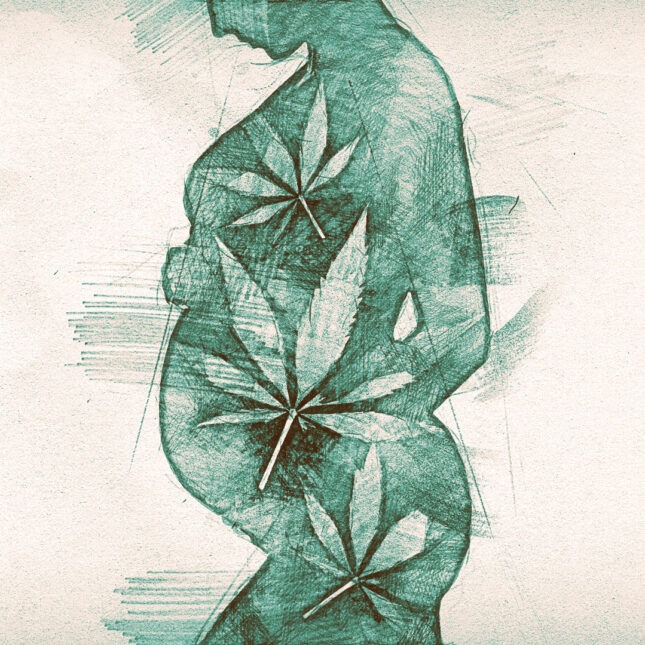A closer look at a complex issue
For years, women have been told to avoid drinking alcohol and smoking cigarettes during pregnancy. But with legalization and de-stigmatization of cannabis, pregnant women are starting to see cannabis as a safe recreational and medicinal alternative, especially since cannabinoids are often used in managing “morning sickness.”
A study of nearly 500,000 women indicated that self-reported past-month medical and non-medical use of cannabis in pregnant women doubled from 2002-2017. [1] While this percentage is still relatively low (approximately 7% of the population surveyed), it certainly raises an important question–is it safe?
Studies have indicated possible negative effects of prenatal cannabis exposure, including lower birth weight, behavioral problems, and changes in cognitive function, but these results have been inconsistent. [2,3] Clinical outcomes are difficult to evaluate prospectively, especially if pregnant women were also taking other substances. [4]
While all potential negative effects of prenatal cannabis exposure are of concern, perhaps the area of greatest apprehension is that of psychosis. It’s no secret that cannabis use (specifically tetrahydrocannabinol, or THC) has been linked to schizophrenia, although whether there is a direct cause and effect has yet to be clarified. There are a few key similarities, however, between the etiology of schizophrenia and prenatal cannabis exposure that are worth noting.
The developmental hypothesis of schizophrenia posits that the disease takes root due to neuronal disruptions during the second trimester of pregnancy. In addition, children born to women pregnant during the winter months are at a higher risk of schizophrenia, likely due to their increased risk of acquiring a virus or infection.
One study showed that, in fetal tissue samples taken during the second trimester, cannabis exposure reduced levels of dopamine receptor expression in an area of the brain that regulates emotion; interestingly, this effect was only seen in males. [5] Dopamine is a key chemical messenger that drives symptoms of schizophrenia, and the condition is more common in males than in females.
A recent pre-clinical study dug a little deeper to provide more insight into this issue. While prenatal exposure to THC did not affect sensory or anxiety behaviors, acute exposure resulted in a significant, sex-dependent disruption. [6] Further evaluation in males indicated higher risk-taking behaviors. Prenatal exposure also increased dopamine activity in a major center of the brain that plays a key role in schizophrenia. When researchers administered a steroid hormone called pregnenolone, which is known to reduce cannabinoid receptor 1 activity, behavioral and physiological disruptions resulting from prenatal cannabis exposure were reversed.
We still have a long way to go in understanding the effects of cannabis on pregnant mothers. And while there are many similarities between schizophrenia etiology and the possible contribution of prenatal cannabis, there is still no concrete cause and effect between the two.
It’s also important to note that pre-clinical studies, such as those referenced, often administer very high doses of cannabis, far higher than most people use. And while the majority of these studies focus on THC, many pregnant women are experimenting with cannabidiol (CBD), believing that it may be safer; unfortunately, we just don’t have the data to support that.
Both the CDC and the FDA recommend against any type of cannabis use (including CBD) both during pregnancy and breastfeeding. Speak with your doctor if you are currently using cannabis and thinking of getting pregnant and certainly consider pausing use during pregnancy until we know more.
Image source: Stat News
References
- Volkow, N.D., et al. “Self-reported Medical and Nonmedical Cannabis Use Among Pregnant Women in the United States.” JAMA, vol.322, no.2, 2019, pp.167-169. (impact factor: 51.273; cited by: 11)
- Huizink, A.C. “Prenatal Cannabis Exposure and Infant Outcomes: Overview of Studies.” Prog Neuropsychopharmacol Biol Psychiatry, vol. 52, 2014, pg. 45-52. (impact factor: 4.315; cited by: 79)
- Wu, C.-S., et al. “Lasting Impacts of Prenatal Cannabis Exposure and the Role of Endogenous Cannabinoids in the Developing Brain.” Future Neurol, vol. 6, no. 4, 2011, pg. 459-480. (impact factor: 0.300; cited by: 72)
- Hayatbakhsh, M.R., et al. “Birth Outcomes associated with Cannabis Use Before and during Pregnancy.” Pediatr Res, vol. 71, no. 2, 2012, pg. 215-219. (impact factor: 2.88; cited by: 113)
- Wang, X., et al. “In Utero Marijuana Exposure associated with Abnormal Amygdala Dopamine D2 Gene Expression in the Human Fetus.” Biol Psychiatry, vol. 56, no. 12, 2004, pp. 909-915. (impact factor: 11.501; cited by: 68)
- Frau, R., et al. “Prenatal THC Exposure Produces A Hyperdopaminergic Phenotype Rescued by Pregnenolone.” Nat Neurosci, vol.22, no.12, 2019, pp.1975-1985. (impact factor: 21.126; cited by: 5)








